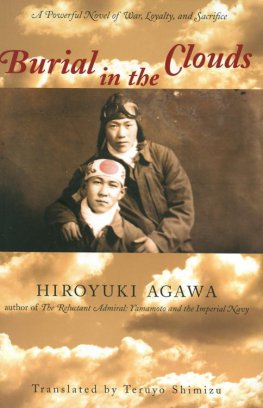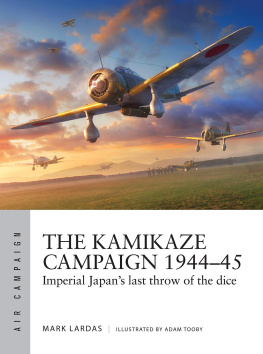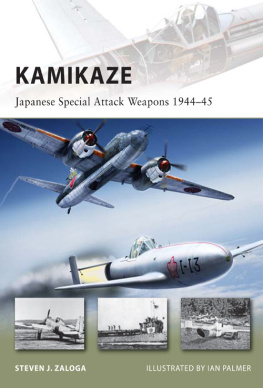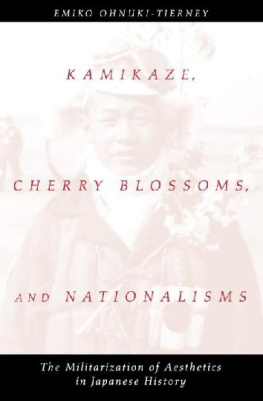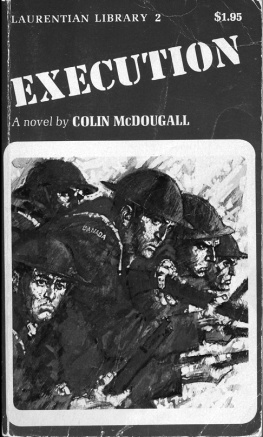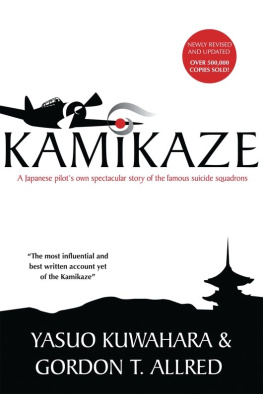Hiroyuki Agawa
BURIAL IN THE CLOUDS

Translated by Teruyo Shimizu

Otake Naval Barracks (Hiroshima Prefecture)
December 12, Showa 18 (1943)
My first Sunday since joining the Imperial Navy. Our duty today was to organize our belongings. I have recovered my composure somewhat and decided to start this journal.
At 11:50 a.m., the day before yesterday, I stepped off the train at Otake Station and headed for the Naval Barracks. Had a physical exam in the afternoon and passed it as B class. I was pronounced flight-worthy, and that determined the course I shall follow. I traded in my school uniform for a sailors togs (called jonbira), and donned that clumsy sailor cap. Our snow-white fatigues were distributed, too. At night, I was taught for the first time how to sling a hammock and how to fold my clothing so as to make a pillow out of it. Had my first navy supper. The dawn following my first night here was cold.
Only four nights have passed since I left bustling Osaka Station, with all my friends and family there to see me off. But I feel now that this must have happened six months ago, a year ago, even three years. It seems like an event lodged deep in the past, and I look back at it as if through the wrong end of a pair of binoculars.
I have no idea whether the navy is hell or paradise, but when I heard the division officer say the word shabathe term navy men use for the free world withoutI fully realized that I had entered a new realm, utterly different and completely estranged from the snug world I have always inhabited. I knew all of this before, of course. Nevertheless, at one moment my spirit balloons out with a courage that floods my entire body, and I am determined to confront whatever comes. And at the next moment it deflates, and I am vexed and bereft, as if thrown into the abyss. I have a lingering attachment to the studies I left behind. I yearn for my parents. Fond sentiments bind me to so many people. And these feelings twine round and round about me, cutting me to pieces in the end. But I suppose we are no longer to choose anything. The only option open to us is to train ourselves, according to a fate already determined.
In the navy a bucket is referred to as a tin case. A dust cloth is an inner gunwale match, a tub is a washtub, and so on. Use of such worldly expressions as boku, kimi, ne, and tono is absolutely prohibited. One slip of the tongue gets you a cow killer from the drill instructora disciplinary knuckle on the forehead. I must become proficient at the language and order of this new society. In fact, I need to master it, down to the minutest detail.
Scholar-sailors like me are grouped according to the schools we are from. There is the Waseda Division, for example, and the Tokyo University Division. There are Divisions from Chu-o University, from Hiroshima Higher Normal School, and of course from our own Kyoto University. I look about me as I write and see Fujikura, with a long face, chewing his Jintan mints. Sakai is writing a postcard. And Kashimawell, he must be someplace around here. In this, I am really quite fortunate.
After our last seminar on the Manyoshu, at the end of November, we played baseball out on the grounds till it grew dark. Then we sat down and talked under a broad oak tree behind the library. Kashima composed a poem for the occasion, which I liked and still remember.
If I remain in one piece,
Will there come a time
When again I see you and you,
Whom I left under the blue Japanese oak?
It encourages me to no end that half of those old friends are living here together.
The tide of the war is not in our favor, but I dont think it is necessarily in favor of the United States either. I can imagine that American students have given up their study of Shakespeare or Whitman to take their place in the battle line, and in a sense the outcome of the war might well be determined by youths like us. I must sink all impertinent thoughts to the bottom of my mind and try to become a man.
The ceremony officially marking our enlistment is set for Monday, which is tomorrow. The commander-in-chief of the Kure Naval Station make a tour of inspection. The turn of a vast wheel galvanizes all the merely private movements of our minds, and we are welded, little by little, into a larger organization.
Fujikura was caught reading this morning as the division officer, Lieutenant Yuhara, delivered a moral lecture. The lieutenant defined one aspect of navy spirit as smartness. He was not talking about stylishness or anything like that. To be smart, he said, is to be swift, flexible, and agile, all the while retaining a certain grace so as never to be rough. We must acquire this smartness in our carriage as well as in our minds, for without it we will be useless to the navy, whether as sailors or as pilots. And then, abruptly, Lieutenant Yuhara thundered:
Whos that reading? Stand up!
We all looked on anxiously. The lieutenant demanded to know what Fujikura had in his hands and was baffled when the latter replied that it was a literary journal. He had to ask again.
I was reading a literary journal, sir, Fujikura all but shouted, in a tone just a shade defiant. The article is on Basho, the poet. My old teacher wrote it. I was just thinking that the smartness you describe is rather like the quality Basho has in view when he speaks of his principle oflightness.
You mean to tell me that you understood what I said, even while reading?"
Yes, sir. I did."
We all got a chuckle out of that, except for the division officer himself. All right, he said. Put down that magazine and dont let this happen again. He gave no further rebuke. Incidentally, Professor O. wrote that article on Basho, and I remember it with nostalgia. At the same time, I formed no bad impression of Lieutenant Yuhara.
We took the Student Reserve Officers Examination this afternoon. The subjects were Japanese, composition, mathematics, and physics. The proctor was our drill instructor, Petty Officer First Class Zenta Yoshimi. If we pass the exam and finish our course at the naval barracks, in a little more than a month we will be given a naval officers uniform and assigned a rank just below midshipman, and we start acquiring skills specific to our positions. Ill probably be sent to the Tsuchiura Naval Air Station.
Petty Officer Yoshimi is among the surviving crew of the aircraft carrier So-ryu, which was sunk at the Battle of Midway Island. He is a veteran of ten years standing, yet before long we will outrank him. And if we find ourselves together on the same battlefield, we students must assume command, taking into our hands the lives of officers like these. We cannot treat the matter lightly. I can well imagine that it wont be pleasant for these drill instructors to see students like usmen who dont know their left from their rightoutrank them, and in such short order, too. But at least our instructor, Petty Officer Yoshimi, has the good humor to say, with a laugh, that he has now become a college professor. Besides, he takes his responsibilities seriously and never makes unreasonable demands of us.
As for the examinations: It is a piece of cake for us to tackle Japanese and composition, but we humanities students are totally out of our element in mathematics and physics. I have only the faintest memory of ever hearing such terms as Ohms law, or Helmholtzs Conservation of Energy, and

